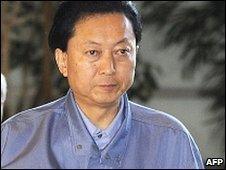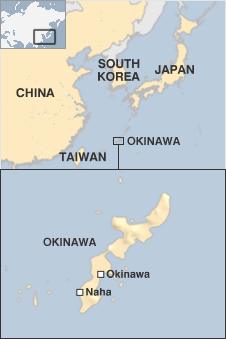Japan PM Hatoyama faces pressure to resign
- Published

Mr Hatoyama said he wanted to tackle Japan's "national challenges"
Japan's Prime Minister Yukio Hatoyama has said he will not resign, despite growing criticism from his own party.
Mr Hatoyama said he would continue to tackle the problems faced by Japan and to do "what is best" for the country.
Pressure has been increasing on Mr Hatoyama after he failed to fulfil an election pledge to move a controversial US base from the island of Okinawa.
At the weekend, the Social Democratic Party (SDP) left the ruling governing coalition because of the issue.
The BBC Tokyo correspondent Roland Buerk says members of Mr Hatoyama's Democratic Party of Japan (DPJ) fear his presence may hinder their chances of re-election in coming polls for the upper house.
Pressure
Mr Hatoyama met his party's senior leader, Ichiro Ozawa on Monday night.

On Tuesday, he told reporters he wanted to co-operate with Mr Ozawa "to tackle national challenges".
Senior cabinet colleagues voiced support for Mr Hatoyama at the same time as expressing concern.
"I have been saying I want the prime minister to fulfil his duties for the full four-year tenure and my thinking hasn't changed," said Deputy Prime Minister and Finance Minister Naoto Kan.
"I believe almost everyone in the DPJ shares the view that we are in a very severe situation," he added.
Mr Hatoyama has been in the job for just eight months, after his centre-left coalition won a landslide at elections last year for the more powerful lower house, but questions over his leadership have dogged the government ever since.
He had promised to move the deeply unpopular Futenma base off the southern island of Okinawa during the campaign for last year's election which swept the DPJ to power.
But he later told the islanders removing it would be "impossible".
After talks with the US last week, he said the base would move to the less populated coastal district of Henoko - in line with a plan announced in 2006.
It was a humiliating climb-down for Mr Hatoyama, our correspondent says.
Polls suggest Mr Hatoyama has been losing popularity in recent months and analysts say this decline is likely to be exacerbated by his U-turn over Okinawa.
Elections to the upper house of parliament are due in July.
- Published30 May 2010
- Published28 May 2010